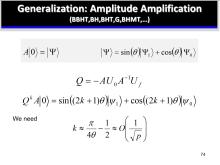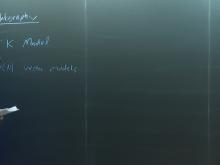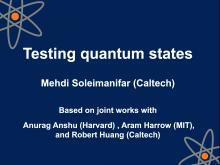Quantum mechanics redefines information and its fundamental properties. Researchers at Perimeter Institute work to understand the properties of quantum information and study which information processing tasks are feasible, and which are infeasible or impossible. This includes research in quantum cryptography, which studies the trade-off between information extraction and disturbance, and its applications. It also includes research in quantum error correction, which involves the study of methods for protecting information against decoherence. Another important side of the field is studying the application of quantum information techniques and insights to other areas of physics, including quantum foundations and condensed matter.
Format results
-
12 talks-Collection NumberC17005
Talk
-

PSI 2016/2017 - Quantum Information Review - Lecture 1
Richard Cleve Institute for Quantum Computing (IQC)
-

PSI 2016/2017 - Quantum Information Review - Lecture 2
Richard Cleve Institute for Quantum Computing (IQC)
-

PSI 2016/2017 - Quantum Information Review - Lecture 3
Debbie Leung Institute for Quantum Computing (IQC)
-

PSI 2016/2017 - Quantum Information Review - Lecture 4
Debbie Leung Institute for Quantum Computing (IQC)
-

PSI 2016/2017 - Quantum Information Review - Lecture 5
Daniel Gottesman University of Maryland, College Park
-

PSI 2016/2017 - Quantum Information Review - Lecture 6
Daniel Gottesman University of Maryland, College Park
-

PSI 2016/2017 - Quantum Information Review - Lecture 7
Kevin Resch Institute for Quantum Computing (IQC)
-

PSI 2016/2017 - Quantum Information Review - Lecture 8
Kevin Resch Institute for Quantum Computing (IQC)
-
-
It from Qubit Summer School
62 talks-Collection NumberC16003Talk
-

-

Gravity Basics - 1
Veronika Hubeny University of California, Davis
-

QI Basics - 1
Patrick Hayden Stanford University
-

Entanglement - 1
Robert Spekkens Perimeter Institute for Theoretical Physics
-

GR: Actions and Equations
David Kubiznak Charles University
-

A new perspective on holographic entanglement
Matthew Headrick Brandeis University
-

Bell’s Theorem
Adrian Kent University of Cambridge
-

QI Basics - 2
John Watrous IBM (Canada)
-
-
Quantum Information in Quantum Gravity II
31 talks-Collection NumberC15041Talk
-

Gravity Dual of Quantum Information Metric
Tadashi Takayanagi Yukawa Institute for Theoretical Physics
-

A new perspective on holographic entanglement
Matthew Headrick Brandeis University
-

Universal holographic description of CFT entanglement entropy
Thomas Faulkner University of Illinois Urbana-Champaign
-

Geometric Constructs in AdS/CFT
Veronika Hubeny University of California, Davis
-

Do black holes create polyamory
Jonathan Oppenheim University College London
-

Tensor Network Renormalization and the MERA
Glen Evenbly Georgia Institute of Technology
-

Entanglement renormalization for quantum fields
Jutho Haegeman Ghent University
-

Holographic quantum error-correcting codes: Toy models for the bulk/boundary correspondence
Fernando Pastawski California Institute of Technology
-
-

A Criterion for Post-Selected Quantum Advantage
Matthew Fox University of Colorado Boulder
-

Universal Microscopic Descriptions for Anomalies and Long-Range Entanglement
Ryohei Kobayashi Institute for Advanced Study (IAS)
-

-

Quantum generators – from stochastic dynamics to Lindbladian extraction
Emilio Onorati Technical University of Munich (TUM)
-

-

Lecture - Quantum Information, PHYS 635
Alex May Perimeter Institute for Theoretical Physics
-

Fermions and Gaussianity ; Resources and Simulability
Andrew Projansky -

Lecture - Quantum Information, PHYS 635
Alex May Perimeter Institute for Theoretical Physics
-

Lecture - Quantum Information, PHYS 635
Alex May Perimeter Institute for Theoretical Physics
-
PSI 2016/2017 - Quantum Information (Multiple Lecturers)
12 talks-Collection NumberC17005PSI 2016/2017 - Quantum Information (Multiple Lecturers) -
-
Quantum Information in Quantum Gravity II
31 talks-Collection NumberC15041Quantum Information in Quantum Gravity II -

A Criterion for Post-Selected Quantum Advantage
Matthew Fox University of Colorado Boulder
Assuming the polynomial hierarchy is infinite, we prove a sufficient condition for determining if uniform and polynomial size quantum circuits over a non-universal gate set are not efficiently classically simulable in the weak multiplicative sense. Our criterion exploits the fact that subgroups of SL(2; C) are essentially either discrete or dense in SL(2; C). Using our criterion, we give a new proof that both instantaneous quantum polynomial (IQP) circuits and conjugated Clifford circuits (CCCs) afford a quantum advantage. We also prove that both commuting CCCs and CCCs over various fragments of the Clifford group afford a quantum advantage, which settles two questions of Bouland, Fitzsimons, and Koh. Our results imply that circuits made of just U \otimes U-conjugated CZ gates afford a quantum advantage for almost all single-qubit unitaries U.
-

Universal Microscopic Descriptions for Anomalies and Long-Range Entanglement
Ryohei Kobayashi Institute for Advanced Study (IAS)
I will present a unified framework for understanding the statistics and anomalies of excitations—ranging from particles to higher-dimensional objects—in quantum lattice systems. We introduce a general method to compute the quantized statistics of Abelian excitations in arbitrary dimensions via Berry phases of locality-preserving symmetry operations, uncovering novel statistics for membrane excitations. These statistics correspond to quantum anomalies of generalized global symmetries and imply obstructions to gauging, enforcing long-range entanglement. In particular, we show that anomalous higher-form symmetries enforce intrinsic long-range entanglement, meaning that fidelity with any SRE states must exhibit exponential decay, unlike ordinary (0-form) symmetry anomalies. As an application, we identify a new example of (3+1)D mixed-state topological order with fermionic loop excitations, characterized by a breakdown of remote detectability linked to higher-form symmetry anomalies.
-

-

Quantum generators – from stochastic dynamics to Lindbladian extraction
Emilio Onorati Technical University of Munich (TUM)
Quantum generators are crucial objects for understanding quantum systems. They encode all the information required to predict the evolution of closed (Hamiltonians) and open memoryless dynamics (Lindbladians). Additionally, they offer structural insight into the noise affecting experimental implementations of quantum processes. In this talk, we will discuss the definition of continuous-time random unitary evolutions characterized by stochastic Hamiltonians, showing mixing properties and efficient convergence to the uniform measure over the unitary group. We will then consider the problem of embedding a quantum map into a Markovian evolution, presenting a scheme to extrapolate the full description of the Lindbladian that is the best fit for the tomographic measurements of any (noisy) quantum channel. Finally, we will introduce a new bound on quantum operators generated by arbitrary time-dependent Hamiltonians by leveraging a correspondence with binary trees structures. References: [1] E. Onorati et al., ‘Mixing properties of stochastic quantum Hamiltonians’, https://arxiv.org/abs/1606.01914 [2] E. Onorati et al., ‘Fitting quantum noise models to tomographic data’, https://arxiv.org/abs/2103.17243 -

Review of recent progress in constructing codes with transversal non-Clifford gates
Michael VasmerQuantum codes with transversal non-Clifford gates have many applications in fault tolerant quantum computation, from magic state distillation to robust IQP circuit sampling.
In the past year, there has been spectacular progress on constructing such codes with optimal parameter scaling, i.e., constant encoding rate and constant relative distance.
These constructions rely on quantum versions of algebraic geometry codes, which generalise the well-known Reed-Solomon and Reed-Muller codes. In this talk, we will describe one such construction that yields a family of good codes with a transversal control-control-Z gate, and we will highlight some of the remaining open problems in this area. -

Lecture - Quantum Information, PHYS 635
Alex May Perimeter Institute for Theoretical Physics
-

Fermions and Gaussianity ; Resources and Simulability
Andrew ProjanskyMatchgates are a well studied class of quantum circuits tied to the time dynamics of Free Fermion Hamiltonians. It is important to note however that Matchgates specifically come from representing Free Fermions with the Jordan-Wigner encoding. When we represent our fermionic systems with other encodings besides Jordan-Wigner, we still are considering the time dynamics of Free Fermion solvable Hamiltonians, but we can introduce complexity in how we encode our fermionic information. This gives us a test ground for clarifying what physical properties make time dynamics hard to simulate, even when Hamiltonians can be exactly diagonalized. In this talk I will discuss the theory behind matchgates, fermionic encodings, and recent results in the simulability of Clifford/matchgate hybrid circuits (arxiv:2312.08447, arxiv:2410.10068). These results clarify resources for Free Fermions represented beyond the Jordan-Wigner encoding, as well as an overall perspective of what it means for a state to be Gaussian. -

Lecture - Quantum Information, PHYS 635
Alex May Perimeter Institute for Theoretical Physics
-

Lecture - Quantum Information, PHYS 635
Alex May Perimeter Institute for Theoretical Physics


